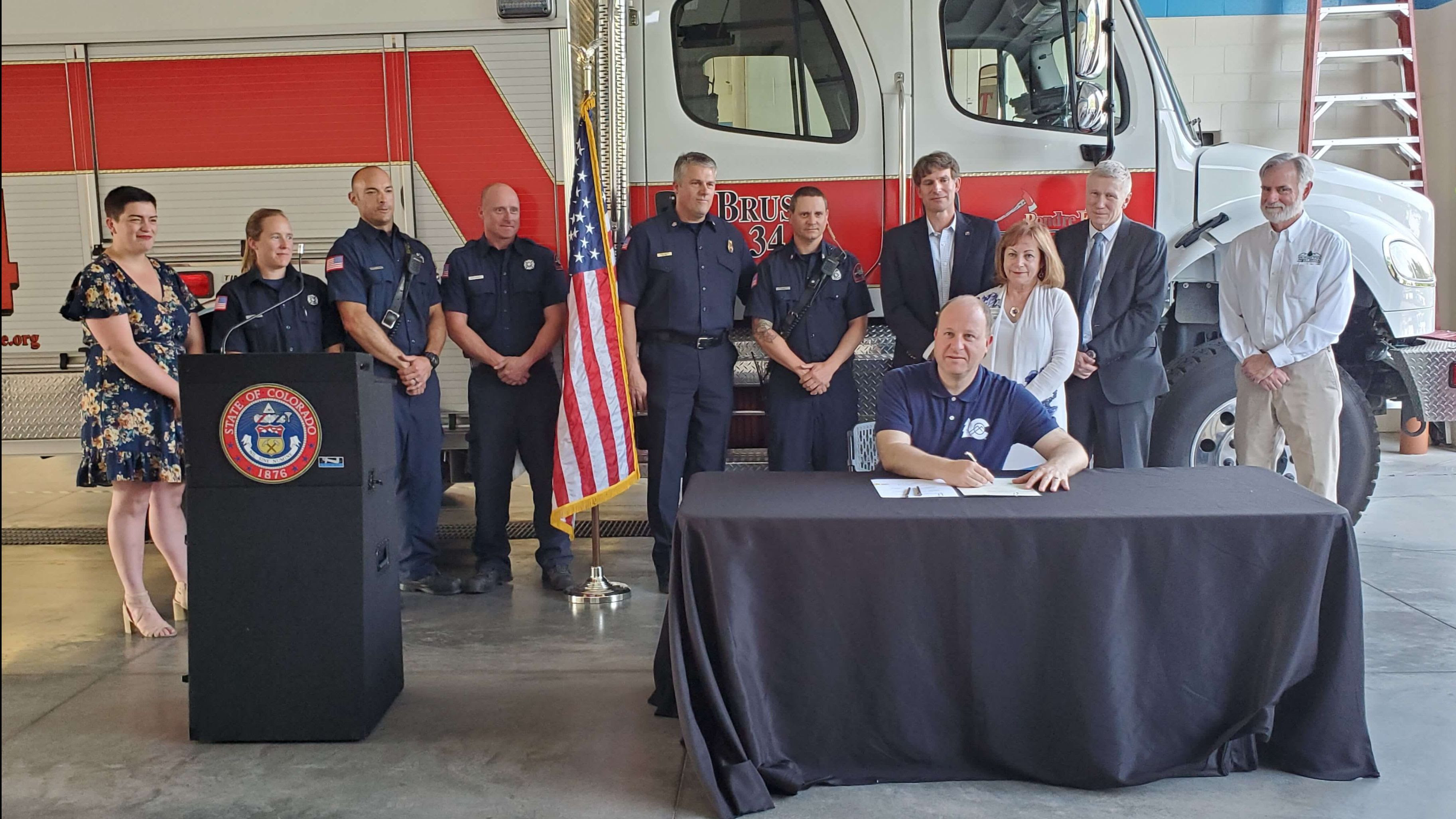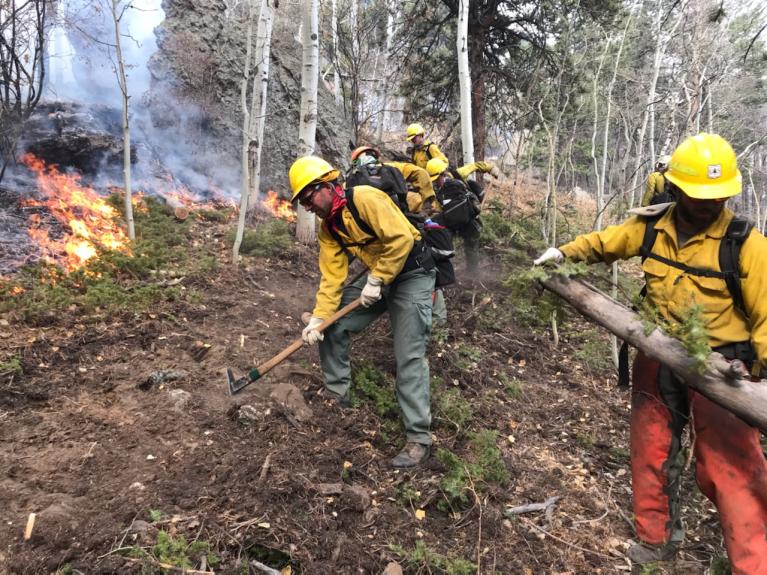The Colorado Department of Natural Resources, Colorado Water Conservation Board, and the Colorado Department of Corrections joined the Governor and legislators today to celebrate legislation to invest $25 million in targeted wildfire risk mitigation and workforce development and $30 million in watershed restoration.
SB21-258, which marks a significant one-time, strategic investment to jumpstart work on wildfire mitigation in targeted locations that connect fuels treatments at landscape-scales to protect communities.
SB21-240 provides $30 million to the Colorado Water Conservation Board to be used for critical watershed recovery efforts, and to ensure our watersheds are more resilient to the growing wildfire and flooding challenges that we face.

“I greatly appreciate the leadership of the Governor and legislators for their commitment to investments to protect Colorado communities, secure our water resources from wildfire, while creating new jobs and opportunities in Colorado’s rural areas. Colorado's wildfire crisis is at a critical juncture and immediate decisive action is necessary to protect lives, homes, businesses, and critical infrastructure,” said Dan Gibbs, Executive Director, Colorado Department of Natural Resources. “Although Colorado has been and remains committed to taking meaningful action to mitigate wildfire risk, past efforts have lacked the coordination, landscape-scale focus, and robust state investment required to properly address the size and behavior of catastrophic wildfires. The legislation will quickly move resources to on the ground projects and mitigation teams with a focus on protecting communities, watersheds and improving forest health.”
The wildfire stimulus bills involve interagency cooperation and collaboration to quickly move resources and workers to shovel ready projects, as well as priority areas for planning. This effort addresses the need to assess risk, plan and implement wildfire risk mitigation projects, expands workforce capacity through investments in the Colorado Youth Corps Association and the Department of Corrections, invests in the development of the forest products industry, and enhances the capacity and flexibility of programs at the Colorado State Forest Service. This bill also creates the hazard mitigation fund in the Department of Public Safety to assist local jurisdictions in obtaining the matching funds required for certain federal hazard mitigation grants.
“The individuals who work on these SWIFT crews have for many years provided a critical fire protection and prevention service during their incarceration,” said DOC Executive Director Dean Williams. “Being a part of SWIFT allows these individuals the opportunity to give back to the community while also learning skills that will help them successfully return to society once they are released. The bill signed today means that substantially more people can participate in this program. These individuals conducting fire mitigation services will be paid increased wages, providing them with some stability when they release, which in turn increases public safety. Many of these crew members have fought on the front lines of the largest fires that have happened in Colorado, and they find dignity and purpose in the work they do. We look forward to working with our partners at the Department of Natural Resources on implementing this legislation.”
Key components for the legislation include:
Planning:
- The deployment of a US Forest Service team to help identify the most critical landscapes in the state for fuels reduction and wildfire mitigation projects.
Workforce development:
- Increase the size of the State Wildland Inmate Fire Team (SWIFT) program to include up to 160 members and expand the focus of the program on forest restoration and wildfire mitigation work.
- Support youth and veterans’ wildfire mitigation crews through a standing partnership between DNR and the Colorado Youth Corps Association.
Strategic investments:
- The creation of a fund to support targeted fuel reduction and wildfire mitigation projects that would reduce the risk of catastrophic wildfire in priority areas.
- Creation of a hazard mitigation fund in the Department of Public Safety to assist local jurisdictions in obtaining the matching funds required for certain federal hazard mitigation grants.
- Substantial investments in the Colorado State Forest Service’s most important programs, and increasing the flexibility and impact of the Forest Restoration and Wildfire Risk Mitigation grant program. State funds can now support capacity building for local forest collaborative groups to develop forest management projects.
Supporting the forest products industry:
- One time investment of funds to the Colorado State Forest Service’s Forest Business Loan Program provides lending capital to businesses to help retain forest-based businesses, maintain or increase local jobs, and enhance the stability of local economies.
This legislation builds on a number of other initiatives which have moved through the Colorado legislature related to the state’s wildfire mitigation and watershed protection efforts. An early bill allocated $6.0 million of one-time funding to the Forest Restoration and Wildfire Risk Mitigation (FRWRM) program within the Colorado State Forest Service for grants this fiscal year. Legislation also increased the annual appropriation to the FRWRM grants to $8.0 million and provided an additional appropriation of $2.0 million to the Healthy Forests Vibrant Communities (HFVC) Fund.
Senate Bill 21-240, signed by Governor Polis, transfers $30 million from the General Fund to the Watershed Restoration Grant Program managed by the Colorado Water Conservation Board (CWCB). This funding will specifically be used for critical watershed recovery efforts following impacts from Colorado's 2020 wildfire season. Funds will be used to match funding from the Federal Emergency Watershed Protection Program, which provides technical and financial assistance to local communities facing fires, floods, and other natural disasters that impair watersheds.
"The stimulus funding through Senate Bills 258 and 240 are critical for helping our on-the-ground partners restore watersheds following one of the worst wildfire seasons on record in 2020. Healthy watersheds are absolutely the foundation to Colorado’s water supply resources," said Rebecca Mitchell, Director, Colorado Water Conservation Board.
This bill also directs the CWCB to conduct a statewide watershed analysis to investigate the susceptibility of life, safety, infrastructure, and water supplies to wildfire impacts, to ensure that future funding is strategically awarded to areas that are at the greatest risk.
###
